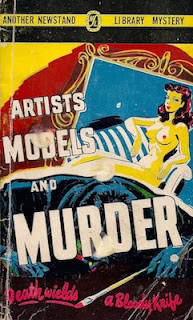So, how was your weekend?
Regular readers will remember that I ended last week's post on Henry C. Clayton's very, very bad Frustration by recommending the novel. There are several reasons why you should read it, and all have to do with the past.
Like any work of fiction – historical novels included – Frustration is of its time, and reveals a good deal about same. A News Stand Library title, it was sold through news stands, not book stores. A cheap thing, it was not built to last much beyond its November 1949 pub date. News Stand Library didn't last long either, but in its brief history, it published several novels about men who make a living as artists. My favourite is Artists, Models and Murder by Toronto-based comic book artist Tedd Steele.
You can see why these books appealed to post-war commuters. Painting nudes for a living is far preferable to, say, processing overdue payments in the accounts department at Sun Life.
Maybe that's just me.
There was the cynical, flippant Tony Pearce who painted gloss nudes, adroitly exaggerating a curve here on the bust, adding length to the thigh there, and so causing virile men to become restless and their wives to rage with futile envy. Tony never put the garments on his creations. They were added to the nude, with just the proper degree of transparency, by air-brush experts at the advertising agency.Today's ad agencies would have no use for Tony – nor air-brush artists – though the manipulation of the female form continues. That in itself makes this novel interesting, but the main reason one should read Frustration has nothing to do with advertising.
Spoilers follow:
The murderer in Frustration – three bodies in total – is Tony's friend Eileen Henley. A talented artist, and smart as a whip, Eileen has by far the most attractive personality in the novel... and yet she is a spinster. To Tony, Eileen is beautiful in every single way except that she walks with "a slight limp." Minutes after meeting Eileen, Tony turns to his agent, Johnny Kozak, and says: "I liked her. Too bad she's crippled."
Tony is sometimes distracted from Eileen's limp by "the swelling of her breasts and the enticing valley between," and so he must remind himself that she is a cripple. Nevertheless, our hero enjoys Eileen's company and is often tempted to give her a kiss. As the novel draws to an end, author Henry C. Clayton rushes things along by having Tony take Eileen to the Stork Club, then really ramps it up:
Funny, wasn't it? The girl he would fall for wasn't perfect – and maybe that was why. Physically perfect girls were a dime a dozen. But the fact that she could ignore her infirmity so blithely, that she could climb the ladder of her career with any sears on her soul, that meant that Eileen was a girl in a thousand.After eats, Tony ends up at his date's Sutton Place flat, where she slips into something more diaphanous:
Eileen came back in to the room and he stared. She was wearing a thin black negligee – and nothing else, and her hair was down on her shoulders. He hardly noticed her limp until her saw clearly her left leg was thinner than the other. Not much, but enough to show. It wasn't nearly as bad as he thought it would be.Yes, not nearly as bad as he thought it would be, but Eileen has let slip something that suggests she just might be the triple-murderer. Tony doesn't do anything about it because her negligee falls open and he is fairly choked by "the heat of her breasts."
Next thing you know, Tony is struggling for breath as Eileen tries to strangle him with a strip of canvas. Fortunately, Tony is able to fish a penknife from his pocket and cut the fabric. Eileen says she has to pee and commits suicide in the bathroom. This leaves our hero to explain her motive:
The girl had beauty and talent, a rare combination, and yet she was deformed. She had a passionate nature, and yet it would be difficult for her to find a husband, a decent husband who was on her own intellectual level.And so, you see, she killed.
"Different times," remarked my wife.
Indeed.
Researching this piece, I learned that last year the World Health Organization recorded just forty-two cases of polio worldwide. It is expected that next year the disease will be eradicated completely.
This information felt good. But it was followed that same day by a video from The Rebel's in-house Jew-hater Gavin McInnes:, in which we find these words:
Who doesn't want to know a handicapped person? That's cooler than a black friend. I want to at least have a friend with, like, a lobster claw. You need that in your repertoire. Friends are baseball cards. You need some freaks in the mix.
Different times.
Frustration is a novel I won't forget. I recommend it to anyone who has so much as a passing interest in the portrayal of the physically challenged in popular fiction.
The Rebel is also recommended. Know thine enemy.
Note: Gavin McInnes is not a "drunk Scotsman," as he claims. He was born in Herefordshire and grew up in Ottawa. That said, I do believe he is a drunk.
Object: A cheap, poorly-produced 158-page mass market paperback, reading Frustration proved to be more challenging than the average New Stand Library title.
I purchased my copy three years ago from bookseller Nelson Ball. Price: $6.00.
Not on WorldCat. Four copies are listed for sale online. Get one while you can!
Related posts:






















